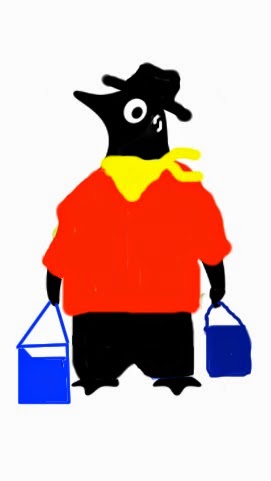Update One of Penguin History of the World

So far I have covered The Introduction, The Foundations, Homo Sapiens which included Homo Erectus first ( I always thought they were the same but they aren't and were quite separate). I must say I really enjoyed the thoughts of us as all tree climbers at one time before homo erectus.
Imagine populating the entire world, except Antarctica walking from continent to continent (over time of course) after the ice age trying to find shelter and food. Although fire was around it was only recently that the use of it happened. I feel like Gary Larsen in the Far Side when I think of people discovering that fire is useful. How did it happen?
Then it goes into The Possibility of Civilization which is basically the ability to congregate and to grow food for one's needs. We covered palaeontology and then into the neolithic which was the beginning of tools.
We hit the chapter on Early Civilised Life which leads into Mesopotamia. I am finding this incredibly interesting because it is 3000 BC and when we first started to write. They discuss the development of seals and markings on clay tablets. Now think if we went to the shop, bought a new dress and got a clay tablet with a seal and mark as a receipt. Like I said this is great fun.
But now I have to stop because we just got to Gilgamesh and his Epic which is about the first written language we had. I have seen Gilgamesh somewhere in my book collection or I thought I had but it must have just been in a second hand book store. I have downloaded the free copy of Gilgamesh who writes about the floods and the fear of death and one of the first discussions of the afterlife. I feel I can't quite go further with Mesopotamia (the middle east) without a couple of days to look at Gilgamesh.
This project is taking on a life of it's own. I think whenever I get to areas in the book (Penguin History) about literature I will stop and have a closer look at it. I am trying to get a more realistic chronology of history and not ever having studied history in my life I need to think about this a bit.
So I am going to spend the next couple of days looking at Gilgamesh's epic and then get back to my history book. I am finding the Penguin History of the World well written and covers all the periods quite succinctly and I am able to follow it. It is easier than I thought it would be but mind you we have only come down from the trees and still have a long way to go. After Mesopotamia we get into the chapter of Ancient Egypt which should be wonderful but then I am getting ahead of myself.
I have just downloaded a free Kindle book of Epics of Gilgamesh (with mixed reviews) and I will look at that. The wonderful thing about a Kindle is that you can get books right away and not lose time or momentum more to the point. But back to the hard copy of Penguin History and I'll update again when I move on a bit. I have no idea if anyone finds this interesting but it is helping me keep ideas straight in my head and make it a bit lighter so I apologise if you get bored and stop reading.
Don't worry I am still reading other books to stay balanced. Yesterday I spend the day on the couch reading The Heart is a Lonely Hunter by Carson Mc Culler's. I could have joined the Readathon had I known the weather would be so cold and windy and I'd be hibernating for a day. I'll talk about that book after I read the last little bit left in the book.
So stay tuned......such excitement. Ha ha


































